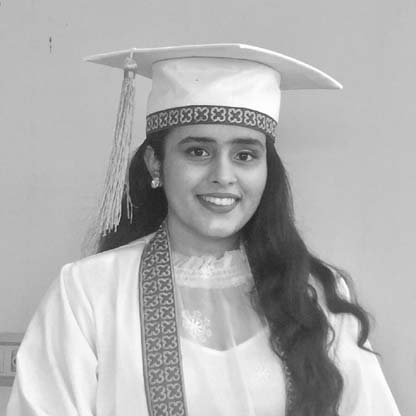
SOHA RANDHAWA
Aspiration Statement
I aim to make a career in research and policy analysis. My particular focus is in the field of public health and I aspire to adopt an interdisciplinary and holistic approach to providing solutions to the public healthcare infrastructure of the country both in terms of research and policy analysis.
Core Skills
- Microsoft Office
- Stata and SPSS (quant analysis)
- MAXQDA
- Power BI
Academic Awards / Achievements
- Tulane University - Masters of Public Health - Social Behavioral & Population Sciences
- Dean’s List - Fall 2019, Spring 2019, Spring 2018, & Fall 2017
Experience
Leadership / Meta-curricular
- SDP Batch of 2020 – Habib University - Elected as Female Senator
Internship / Volunteer Work
- Tulane University - Graduate Assistant
- Emroy University - Research Intern at Jane Fonda Center for Adolescent Reproductive Health
- Legal Aid Society - Delivery Associate for Data
- IRD Pakistan—CEC Mental Health Programme - Training & Learning Intern
- Office of Institutional Research (OIR) – Habib University - Student Research Assistant
- Inspired by Her (IBH) Pakistan - Managing Director
- Kawish (HU TCF chapter) - Curriculum Designer & English Coordinator
- The Citizens Foundation (ADP) - Intern
Publications / Creative Projects
- Catalogue on “Traditional Ways of Waste Management”
Final Year Project
Project Title
Implication of Provincial Policies on Karachi’s Wedding Halls
Description
This paper studies the Karachi marriage hall policies in relation to its implications. Using the qualitative research approach, it operationalizes the Critical Discourse Analysis (CDA) and is further guided by the intersectionality theory, the research investigates the power relations between different stakeholders involved in the policy scene. Being exploratory in nature, the research wishes to understand whether and how the class or political influence of the client enables them to bypass a policy. The research uncovers through the findings, retrieved from interviews with two marriage hall owners and the President of the Karachi Marriage Hall Association (KMHA) that not only the clients but the owners’ class, power, and political influence too play a role in passing a policy. Moreover, the analysis consolidates the linkages to what the theory of intersectionality propounds and establishes that the implications on the marriage hall economy are consequential, directly or indirectly.